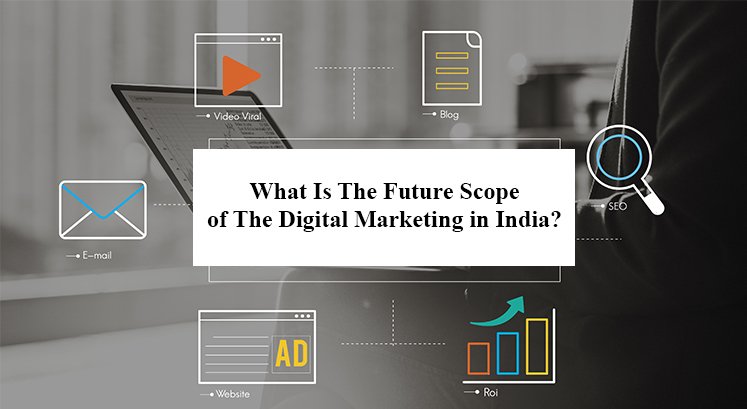Future Scope Of Digital Marketing
Last updated on May 29th, 2023 at 10:40 am
The future scope of digital marketing is vast and promising. As technology continues to evolve and consumer behavior shifts, digital marketing will play a crucial role in helping businesses connect with their target audiences and achieve their marketing goals. Here are some key areas that hold significant potential for the future of digital marketing

Artificial Intelligence (AI)
AI will revolutionize digital marketing by enabling businesses to gather and analyze vast amounts of data, automate tasks, and deliver personalized experiences at scale. AI-powered chatbots, predictive analytics, recommendation engines, and automated ad campaigns are just a few examples of how AI can enhance digital marketing strategies.

Voice Search and Smart Speakers
With the rising popularity of voice assistants like Amazon Alexa, Google Assistant, and Apple Siri, optimizing digital marketing efforts for voice search will become increasingly important. Marketers will need to adapt their SEO strategies to accommodate voice queries and provide concise, relevant answers to user inquiries.

Augmented Reality (AR) and Virtual Reality (VR)
AR and VR technologies offer immersive and interactive experiences to users. Digital marketers can leverage these technologies to create engaging campaigns, allowing consumers to experience products, services, or virtual environments before making a purchase. For example, AR filters on social media platforms can enable users to try on virtual makeup or clothing items.

Influencer Marketing
Influencer marketing is expected to continue its growth as consumers seek authentic recommendations from individuals they trust. Influencers, with their established online presence and dedicated followers, can help brands reach their target audiences effectively. However, the landscape of influencer marketing may evolve, with an increased focus on micro-influencers who have niche audiences and higher engagement rates.

Video Marketing
Video content is already dominant in digital marketing, and its significance will only increase in the future. Platforms like YouTube, TikTok, and Instagram Reels continue to gain popularity, making video an essential medium for storytelling, product demonstrations, and brand promotion. Short-form videos, live streaming, and interactive video experiences are likely to become even more prevalent.

Personalization and Data Privacy
Consumers are becoming increasingly concerned about data privacy, and regulations like the General Data Protection Regulation (GDPR) and California Consumer Privacy Act (CCPA) reflect this trend. Marketers will need to balance personalization efforts with transparency and consent, ensuring that data-driven strategies respect user privacy preferences.

Mobile Marketing
Mobile devices are integral to people’s lives, and mobile marketing will remain a key focus. Optimizing websites and campaigns for mobile devices, utilizing mobile apps, and leveraging location-based targeting will continue to be essential for reaching and engaging mobile users effectively.

Social Media Marketing
Social media platforms are continually evolving, and digital marketers must stay updated on emerging trends and features. The growth of platforms like TikTok, Instagram, LinkedIn, and Snapchat provides new opportunities for brands to connect with their target audiences through creative content, influencer partnerships, and community engagement.

Data Analytics and Insights
With the increasing volume of data available, leveraging analytics tools and extracting actionable insights will be crucial for digital marketers. Businesses will need to invest in data-driven decision-making, using analytics to measure campaign performance, understand customer behavior, and optimize marketing strategies.

Sustainability and Ethical Marketing
As consumers become more environmentally and socially conscious, there is a growing demand for brands to demonstrate their commitment to sustainability and ethical practices. Digital marketing can be used to effectively communicate these values, share brand stories, and engage with socially responsible initiatives.

Overall, the future of digital marketing is shaped by technological advancements, changing consumer preferences, and a greater emphasis on personalization and ethical considerations. Digital marketers who stay adaptable, embrace emerging technologies, and prioritize customer-centric strategies will be well-positioned to succeed in this evolving landscape.


